On a recent project, I needed to run a performance test where tens of thousands of network devices communicate with a DHCP server. After the test, I wanted to create a pretty graph of the number of DHCP requests hitting the server.
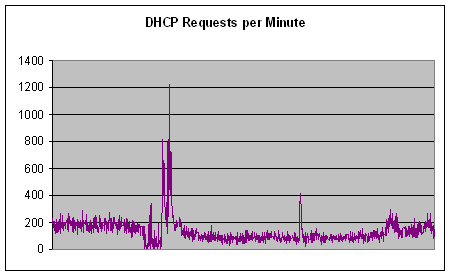
Using a combination of AWK and Excel, I had a solution within half an hour…
The DHCP server writes events to a log file like this:
Aug 8 00:00:01 rchmms010 dhcpd: DHCPDISCOVER from 00:1d:ed:40:5f:b6 via 10.1.255.254
Aug 8 00:00:01 rchmms010 dhcpd: DHCPOFFER on 10.1.210.152 to 00:1d:ed:40:5f:b6 via 10.1.255.254
Aug 8 00:00:01 rchmms010 dhcpd: DHCPDISCOVER from 00:1d:ed:40:53:e8 via 10.1.255.254
Aug 8 00:00:01 rchmms010 dhcpd: DHCPOFFER on 10.1.239.99 to 00:1d:ed:40:53:e8 via 10.1.255.254
Aug 8 00:00:01 rchmms010 dhcpd: DHCPREQUEST for 10.1.239.99 (172.25.30.115) from 00:1d:ed:40:53:e8 via 10.1.255.254
Aug 8 00:00:01 rchmms010 dhcpd: DHCPACK on 10.1.239.99 to 00:1d:ed:40:53:e8 via 10.1.255.254
Aug 8 00:00:02 rchmms010 dhcpd: DHCPDISCOVER from 00:1d:ed:40:89:7d via 10.1.255.254
Aug 8 00:00:02 rchmms010 dhcpd: DHCPOFFER on 10.0.178.200 to 00:1d:ed:40:89:7d via 10.1.255.254
Aug 8 00:00:04 rchmms010 dhcpd: DHCPDISCOVER from 00:1d:ed:40:5f:b6 via 10.1.255.254
Aug 8 00:00:04 rchmms010 dhcpd: DHCPOFFER on 10.1.210.152 to 00:1d:ed:40:5f:b6 via 10.1.255.254
Aug 8 00:00:04 rchmms010 dhcpd: DHCPREQUEST for 10.1.210.152 (172.25.30.115) from 00:1d:ed:40:5f:b6 via 10.1.255.254
Aug 8 00:00:04 rchmms010 dhcpd: DHCPACK on 10.1.210.152 to 00:1d:ed:40:5f:b6 via 10.1.255.254
Aug 8 00:00:05 rchmms010 dhcpd: DHCPDISCOVER from 00:1d:ed:40:55:f4 via 10.1.255.254
Aug 8 00:00:05 rchmms010 dhcpd: DHCPOFFER on 10.0.187.211 to 00:1d:ed:40:55:f4 via 10.1.255.254
Aug 8 00:00:05 rchmms010 dhcpd: DHCPDISCOVER from 00:1d:ed:40:89:7d via 10.1.255.254
Aug 8 00:00:05 rchmms010 dhcpd: DHCPOFFER on 10.0.178.200 to 00:1d:ed:40:89:7d via 10.1.255.254
Aug 8 00:00:05 rchmms010 dhcpd: DHCPDISCOVER from 00:1d:ed:40:79:19 via 10.1.255.254
Aug 8 00:00:05 rchmms010 dhcpd: DHCPOFFER on 10.0.200.135 to 00:1d:ed:40:79:19 via 10.1.255.254
Aug 8 00:00:05 rchmms010 dhcpd: DHCPREQUEST for 10.0.178.200 (172.25.30.115) from 00:1d:ed:40:89:7d via 10.1.255.254
Aug 8 00:00:05 rchmms010 dhcpd: DHCPACK on 10.0.178.200 to 00:1d:ed:40:89:7d via 10.1.255.254
Obviously there are four message types: DHCPDISCOVER, DHCPOFFER, DHCPREQUEST, and DHCPACK. But the highly observant among you will have also noticed that the number of columns (space delimited) differs depending on the message type (DHCPDISCOVER=10, DHCPOFFER=12, DHCPREQUEST=13, DHCPACK=12).
Just to make things more difficult, there are occasional rows that have 11 and 15 columns.
Aug 8 00:10:46 rchmms010 dhcpd: uid lease 10.0.251.247 for client 00:1d:ed:40:2d:75 is duplicate on 10.0/15
Aug 8 00:30:58 rchmms010 dhcpd: Wrote 39312 leases to leases file.
The varying number of columns makes it impractical to process the logs using LogParser (which would have been a really neat solution), and the fact that the log file may have millions of rows means that Excel (by itself) is not the right tool either.
I wanted to aggregate the different types of request for each minute, and output a file for graphing in Excel. Writing a simple AWK program was a neat way to process the log file.
# This aggregates DHCP log files into types of request per minute.
# Types of request: DHCPDISCOVER, DHCPOFFER, DHCPREQUEST, DHCPACK
#
# Usage: gawk -f aggregate_dhcp.awk dhcp.log.1
#
# References:
# The GNU Awk User's Guide (http://www.gnu.org/manual/gawk/gawk.html)
# Wikipedia: DHCP (http://en.wikipedia.org/wiki/Dynamic_Host_Configuration_Protocol)
BEGIN {
FS = " " # fields in the input file must be separated by a space.
OFS = "\t" # Output Field Separator is a tab.
previousTime = ""
previousDay = ""
outputFile = "" # The file name will change depending on the date of the DHCP event in the log.
# Keep a count of the different DHCP message types.
numDhcpDiscover = 0
numDhcpOffer = 0
numDhcpRequest = 0
numDhcpAck = 0
print "Started processing DHCP log..."
}
# Do this for every line in the input file
{
if ($6 == "DHCPDISCOVER") {
numDhcpDiscover++
} else if ($6 == "DHCPOFFER") {
numDhcpOffer++
} else if ($6 == "DHCPREQUEST") {
numDhcpRequest++
} else if ($6 == "DHCPACK") {
numDhcpAck++
} else {
print $0 >> "errors.txt"
}
# Write a new header for each output file (1 output file for each day)
currentDay = $2
if (currentDay != previousDay) {
outputFile = "DHCP_log_" $1 "_" $2 ".txt"
# Time DHCPDISCOVER DHCPOFFER DHCPREQUEST DHCPACK
print "Time", "DHCPDISCOVER", "DHCPOFFER", "DHCPREQUEST", "DHCPACK" >> outputFile
previousDay = currentDay
}
currentTime = substr($3, 0, 5) # Convert hh:mm:ss to hh:mm
if (currentTime != previousTime) {
# Output format:
# Time DHCPDISCOVER DHCPOFFER DHCPREQUEST DHCPACK
print currentTime, numDhcpDiscover, numDhcpOffer, numDhcpRequest, numDhcpAck >> outputFile
# Reset counters.
numDhcpDiscover = 0
numDhcpOffer = 0
numDhcpRequest = 0
numDhcpAck = 0
previousTime = currentTime
}
}
END {
print "Finished."
}
Here is the output of the AWK program (for the first 15 minutes of the DHCP server’s log file):
Time DHCPDISCOVER DHCPOFFER DHCPREQUEST DHCPACK
00:00 102 101 63 64
00:01 84 84 47 47
00:02 81 81 43 43
00:03 106 107 62 61
00:04 93 92 51 52
00:05 101 101 57 57
00:06 65 65 39 39
00:07 79 79 44 44
00:08 76 76 45 45
00:09 86 87 56 55
00:10 120 119 66 67
00:11 106 107 60 59
00:12 101 100 63 64
00:13 83 83 54 54
00:14 66 66 37 37
00:15 82 82 48 48
…and here are some example graphs:
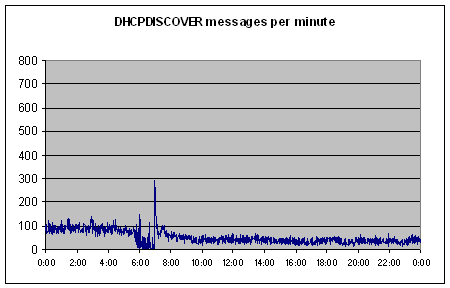
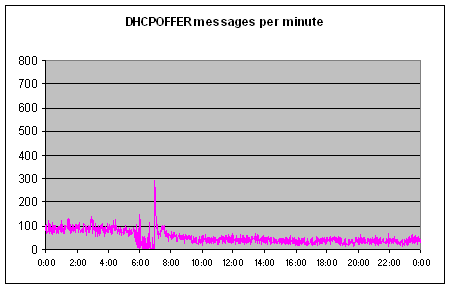
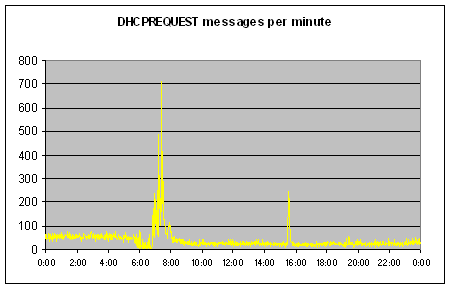
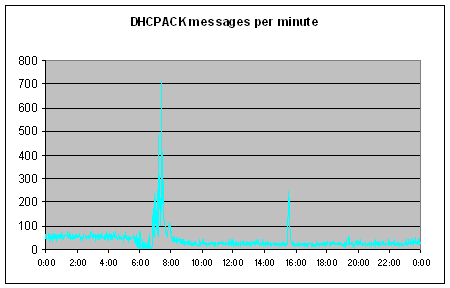
6 Comments
Comments are closed.



Note that the graphs above are just from a normal day on the DHCP server, not from my actual performance test. 🙂
Nice work Stu!!
Although I could have done it in less lines in Perl 🙂
I’m sure you could write it in less lines of Perl, but would anybody be able to read it? 😉
Awk rocks, used to use it a lot. I notice these days though, the data matches the tools more, so I haven’t had to reach for it in a long time.
On gawk 1.4.0.1 we have errors:
gawk: /var/www/sites/system/dhcpawktest.awk:24: BEGIN {
gawk: /var/www/sites/system/dhcpawktest.awk:24: ^ syntax error
gawk: /var/www/sites/system/dhcpawktest.awk:82: END {
gawk: /var/www/sites/system/dhcpawktest.awk:82: ^ syntax error
gawk: /var/www/sites/system/dhcpawktest.awk:84:
gawk: /var/www/sites/system/dhcpawktest.awk:84: ^ syntax error
I think that the space character between the “BEGIN” and the “{” is causing the syntax error for you. See Stack Overflow: BEGIN and END causing syntax error in gawk.
yep 😐